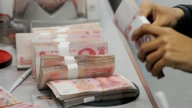【新唐人2014年05月14日讯】中共和越南日前因为西沙探油井问题,发生近百艘船舰对峙,三天内两度百次撞击,中方海警船还一度发射水炮。战争大有一触即发之势。不过,中国与菲律宾也因南海问题,关系在恶化。12号,菲律宾起诉此前在争议海域内逮捕的11名中国渔民,导致南海局势更加紧张。请看报导。
菲律宾司法部门向巴拉望公主港地方法院,以“非法盗猎”的罪名起诉了此前被抓扣的中国渔民。菲律宾方面报导说,9名中国渔民被起诉,另有2人因为未成年会被遣返。
根据菲律宾法律,他们将面临12到20年的监禁。
这些渔民是今年5月6号,被菲律宾军警在南沙群岛半月礁附近的海域,拦截并扣留的。菲律宾声称,在被扣的中国渔船上发现了500只海龟,从而将这些渔民关押。
中共官媒《环球时报》说,从菲律宾目前公布的资讯来看,并没有明显的证据证明中国渔民捕捞海龟,更可能是这些渔民从菲律宾人手上购买了海龟。
中共官媒还说,进入2000年后,菲律宾不断强制扣押中国渔船、逮捕渔民,背后有很浓的政治意味。一般渔民被抓后,会被要求签一份“ 认罪书”,承认“非法越界到菲律宾海域捕捞”之类的罪名,从而变相让渔民承认菲律宾对南海海域拥有主权。
美国“纽约城市大学”政治学教授夏明指出,菲律宾通过起诉中国渔民捕捉和贩卖珍稀动物海龟,有变相的对“有争议”的领土宣布主权的意思。
美国纽约城市大学政治学教授夏明:“对菲律宾方面,它不仅逮捕中国的船员,而且还逮捕菲律宾的公民。在这种情况下,他要起诉的话,它可以不作为领土的争端来给中国颜色看,他可以通过基本的《国际法》。”
夏明表示,如果中国渔民被判刑的时间很长,中共就会很丢面子。下一步他们肯定要报复,南海会更不太平。
5月7号和9号,中共外交部发言人就表示,中国对包括半月礁在内的南沙群岛及附近岛屿,拥有无可争辩的主权,菲律宾方面针对中国渔民采取的任何行动,都是非法和无效的。
外交部还警告菲律宾不要再采取任何挑衅行动,要无条件放人、放船,并确保不再发生类似事情。
中共驻菲律宾使馆还派遣了两名官员前往法院斡旋,要求释放中国渔民,并强调渔民捕鱼的地点属于中国领土。但菲律宾认为这些中国渔民是越境非法捕捉濒危物种,因此,拒绝中方的要求。
南海是中国与世界各地取得联系的重要海上通道,每年大约有4万多艘船只经过南海海域。此外,初步估算南海海底石油蕴藏量高达二百亿吨。从军事战略上来讲,控制了南海岛礁,就等于直接控制了亚洲的交通要喉。
近年来,中国与菲律宾、越南和马来西亚,在南海海域都有领土上的争议,中方还与菲律宾发生多次冲突。
在2012年,中、菲就在南海的黄岩岛对峙了一个多月﹔今年3月,菲律宾还就“中菲南海争端”提起了国际仲裁,他们向联合国提交了数千页的证据。
中国最近同越南在南海也发生了接近战争的冲突,中共还动用了海监船和飞机。
夏明表示,中国、菲律宾和越南,他们都在用各种手段,不断的试探对方的底牌,如何才能在领土上更多获益。从总体上来讲,南海的冲突正在加剧。
夏明:“他用非领土争议的方式,比如用逮捕渔民走私珍稀动物方式,或者中国通过开发石油探井的方式。他们是通过小动作,想获得一些在领土上或主权上的比较大的让步。”
夏明指出,目前中共与整个东盟国家都有冲突,整体关系都在恶化。
采访/陈汉 编辑/宋风 后制/陈建铭
China And The Philippines Clash Again
Recently, the Chinese Communist Party (CCP) has
clashed with The Philippines over Xisha oil exploration.
Reportedly, nearly one hundred ships were
involved in three days of repeated confrontations.
Chinese maritime police boats used water cannons,
and it is suggested that a war may be imminent.
The relationship between China and The Philippines
has also deteriorated over the South China Sea.
On March12, The Philippines prosecuted 11 Chinese
fishermen, who had been arrested in the disputed area.
This has led to increased tensions in the South China Sea.
The Filipino Judiciary charged the detained
Chinese fishermen for “illegal poaching" at
Puerto Princesa District Court of Palawan.
Reportedly, nine Chinese fishermen were
charged, and two minors will be repatriated.
Under Filipino laws, they will face 12-20 years in prison.
The fishermen were intercepted and
detained on May 6 by Filipino military police.
This took place in the waters near
the Nansha Islands Half Moon Reef.
The Philippines claimed they found 500 sea turtles
on the Chinese fishing boats, and detained the men.
China’s state Global Times said that from information
published by The Philippines, there is no clear evidence
that the Chinese fishermen had caught sea turtles.
It is more likely they purchased the turtles from Filipinos.
Official state media also stated that The Philippines has
continuously detained Chinese fishing boats since 2000.
This reportedly has a very strong political overtone.
When fishermen are arrested, they will be asked
to sign a “confession" recognizing that they were
involved in “illegal fishing in Filipino waters".
This is to have the fishermen recognize The
Philippines’ sovereignty over the South China Sea.
Professor Xia Ming, a political science expert
from U.S. City University in New York, points
out that The Philippines intends to announce
its sovereignty over these disputed territories.
It does so, by charging Chinese fishermen
catching and selling endangered turtles.
Xia Ming: “The Philippines not only arrested Chinese
crew members, but also citizens of The Philippines.
The prosecution can be based on “International Law",
rather than related to territorial disputes to confront China."
Xia Ming said that if the Chinese fishermen are given
a long-term sentence, the CCP will be humiliated.
Next, the CCP will certainly retaliate. The
South China Sea would see more conflict
On May 7 and May 9, a CCP Foreign Ministry spokesman
said that China has indisputable sovereignty over Nansha
Islands, including Half Moon Reef and it’s adjacent islands.
Any action from The Philippines against
Chinese fishermen are illegal and ineffective.
The CCP Foreign Ministry also warned The
Philippines not to take any provocative actions.
It also called for the unconditionally release
of the fishermen, and the return of their ships.
It also asked that The Philippines ensure
that no similar things will happen in the future.
The CCP Embassy in the Philippines
sent two officials to the court for mediation.
They demanded the fishermen be released,
and emphasized the location they were
fishing in was part of Chinese territory.
But The Philippines argues that they illegal
caught endangered species in a cross-border
area, and therefore rejected China’s request.
The South China Sea is a vital sea channel
connecting China with the rest of the world.
There are more than 40,000 vessels
crossing the South China Sea each year.
In addition, preliminary estimates indicate that the South
China Sea oil reserves are as high as twenty billion tons.
From a strategic military perspective, controlling
Nansha Islands and the reefs is equivalent
to direct control of vital traffic in Asia.
In recent years, China has disputed this territory
with The Philippines, Vietnam and Malaysia.
China has had many clashes with The Philippines over this.
In 2012, the CCP and The Philippines had a confrontation
over Huangyan Island, which lasted over a month.
In March, 2014, The Philippines filed international arbitration
to the U.N., and submitted thousands of pages of evidence.
Clashes that were close to escalating war also occurred
between the CCP and Vietnam at South China Sea.
The CCP mobilized ocean surveillance ships and aircraft.
Professor Xia Ming says that China, The Philippines
and Vietnam, are using various strategies.
They are constantly testing each other,
to see how to benefit more in the territory.
Generally speaking, the South
China Sea conflict is intensifying.
Xia Ming: “They used non-territorial disputes such as
arresting fishermen smuggling endangered animals.
Or, they use China’s development
of petroleum exploration wells.
They want to get relatively large concessions
on sovereignty over territory though small actions."
Xia Ming points out that the CCP has conflicts with all the
ASEAN countries, and the overall relationship is deteriorating.
Interview/Chen Han Edit/Song Feng Post-Production/Chen Jianming




























